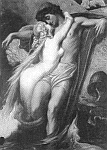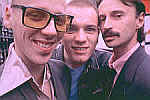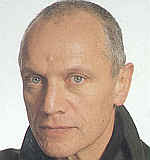|
home
advanced |
Figuring Figuration by
Deborah Knight 8.1 `Berkoff´s´ criticism of woman´s culturally figured sexual identity There may be plenty of pathos in the fact that Sylv’s description of Mike ‘gently’ lifting her skirt is immediately contradicted by her imitation of him raping her, but her subsequent nostalgic ‘I miss him true’ brings the house down. When Berkoff writes that the laughter he heard from his first audiences for East back in 1975 was 'the kind of laughter that came not only from the belly but had the ring of familiarity, that sudden explosive yelp of identification, when they laughed hardest, the dirty beasts’ [Ref 3-01], one cannot help wondering what other emotions lay behind some of those identifications.
Especially when theatrical techniques such as Berkoff’s highlight how unrequited the sentiments and/or how redundant the beliefs are that keep women locked into such painful life roles. By viewing certain events from the varying perspectives of different characters and by allowing each to reveal their awareness of the import of their observations in their narration of them, Berkoff highlights the absurdity of their stubborn refusal to take note of the perfectly perspicacious insights they have as to the causes of their misery. One could well imagine Berkoff asserting as Joan Smith did in the conclusion to her book, Misogynies, that his aim is to:
When I read a review such as the one I cited towards the end of 4.2 of the Autobiographical Texts section by Lyn Gardner, I can well understand Berkoff’s irritation with critics as one cannot help wondering if this particular one went to see East with her eyes shut. It is perfectly obvious that the portrait he draws of male misogyny and female pride in its virtuous masochism is intended to be a vivid wake up call to a ‘civilization’ that continues to countenance the existence of this double-sided malaise on every level of society.
One could certainly imagine he would have every reason to continue as she did:
While Berkoff has just finished touring parts of the world with his one-man show ‘Shakespeare’s Villains’, his long-term ally, Linda Marlowe, is still touring England with her one-woman show ‘Berkoff’s Women’ [Ref 3-03]. Would the similarity in the titles of these two shows imply that another comparative identification is being made between Berkoff and the Bard?
However, if women are hardly the innocents they pretend to be in Berkoff’s world, more than amply returning man’s initial villainy by rubbing his nose in his own injunctions, the diversity of the portraits of women taken from excerpts of his plays and short stories that make up Marlowe’s show bear witness to his incredibly keen observation and understanding of them and their situation in society. Moving from the fashionably superficial Helen of Decadence to the murderously revengeful Clytemnestra of Agamemnon to the dispirited Mum of East to the neurosis of Donna of Kvetch to the masochistic Sylv of East to the sexually fulfilled Wife of Greek and, in the same play, on to the ‘goddess woman’ feminism of the Sphinx, Marlowe finishes with a monologue that changes the third person narrative of the short story “From My Point of View” to the first person narrative of ‘Woman’. Calmly looking out on to the audience over her cocktail glass, this extremely sophisticated worldly actress says, as if contributing to small talk with the most banal of observations:
If this statement is entirely self-evident to the greater part of heterosexual and bi-sexual women, it has to be remarked for how very unused audiences are to hearing such evidences pronounced in public still today, and especially from the prescriptive heights of a woman who must be well into her fifties. Bathetic though it may be, is it not time for us all to grow a little more accustomed to statements such as this that fearlessly admit to woman’s sexual pleasure in man? Have we not heard enough about her masochistic sense of virtue or of sin that leads her to consider herself as sexual only through the eyes of men? If feminism may have made (debatable) inroads upon those particular myths, has it not conversely contributed far more greatly to the war between the sexes than to reconciling them? Whereas I hold Berkoff’s writing in very high esteem for its contemporary efforts to call public attention to man and woman’s perennial discontent and its causes, I am looking forward to the day when actresses such as Linda Marlowe will no longer have to resort to the words of male writers in order to express beneath the spotlight of the stage those positive sentiments that reverberate in the smiling members of her audience. However, in the meantime, I am grateful for his efforts to put over in the public place what Margaret Atwood expresses so succinctly in her article “Pornography”:
8.2 The omnipresent libido in Berkoff’s writings Steven Berkoff has had enormous impact on the theatre of England today.
However, there is an overall reticence in the literary world to give Berkoff the credit he deserves, although newspaper critics are gradually becoming bolder in their praise of his use of language. The above quotation comes from one of the very few books on theatre that includes him, and perhaps the sentence that follows it hints at a certain embarrassment that could be the cause for the traditional reserve Berkoff’s work has met with: ‘Throughout the 1980s [Berkoff] ran counter to the prevailing political dreariness, and was scorned for his innocence and naivety, but he midwifed a lot of the richer drama that was to follow’ (27). It is true that certain aspects about some of the plays such as Sink the Belgrano! and Brighton Beach Scumbags are remarkably childish, but I have to agree with Dromgoole when he writes about the livening effect of Berkoff’s work:
I hasten to add, however, how wholeheartedly I disagree with his assertion that there is ‘little intellectual cohesion’ behind Berkoff’s work. I hope this dissertation has been successful in proving that there is plenty. Perhaps the following passage gives us a clue as to the nature of the obstacle that stops Dromgoole from seeing the cohesion:
Is Dromgoole not revealing himself to be guilty of the very fault he accuses Berkoff’s work of? What does he mean by writing from one’s ‘center’? We so often hear terms of this sort casually tossed about and we all nod our heads knowingly, but what do they mean? Perhaps the following passage from The Aesthetics of Excess may help the reader to decide for him or herself whether Berkoff, like any other writer, is writing from his ‘center’ or not:
In fact, if we reflect on the nature of the theme Berkoff revisits incessantly in his journals, short stories, and plays, and on his use of bathos and elevation to constantly remind us of our dependence on figuration to express ourselves, perhaps we could consider him to be writing from his ‘center’ a little more than most.
© Deborah Knight 2001 |





